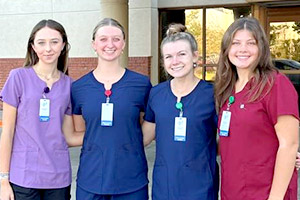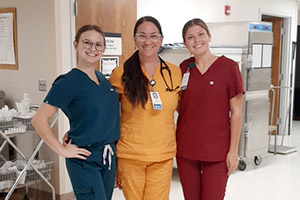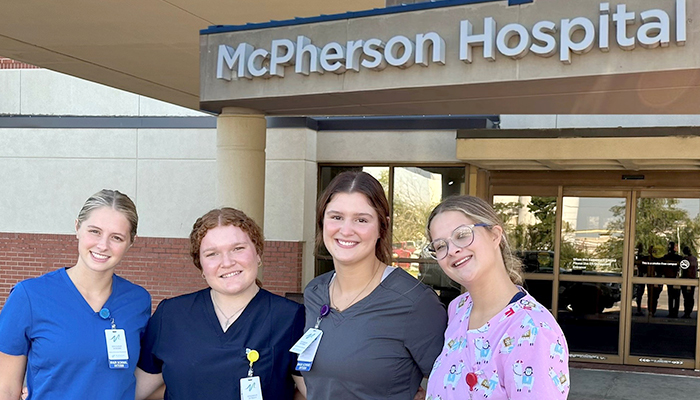McPherson Hospital High School Internship Program
- Need: To provide high school students with hands-on health care experience while filling high-need roles in a rural hospital.
- Intervention: An internship program for high school students at McPherson Center for Health in McPherson, Kansas.
- Results: More than 30 students have participated in the program since 2023, seven of whom have become part-time or full-time employees at the hospital as a result.
Description
McPherson Center for Health, a hospital in rural McPherson, Kansas, was looking for creative new ways to fill certain entry-level roles, including positions for Certified Nursing Assistants (CNAs) and phlebotomists. At the same time, hospital leadership wanted to encourage an interest in rural medicine among local high school students interested in pursuing medical careers, in the hopes that those students might choose to work and live locally after graduation. To address both of these needs, the hospital created an internship program for high school seniors with their CNA certification; McPherson High School offers a CNA course each year that is open to juniors.
 "There's talent in our
small town, but kids tend to have the idea that bigger is
better and that they want the excitement of a city," said
Jamie Hicks, Director of Education and Patient Experience
at McPherson Hospital. "If we put them in our small rural
hospital system and teach them about the culture and
family and patient-centered care here, we're hoping that
draws them back to rural."
"There's talent in our
small town, but kids tend to have the idea that bigger is
better and that they want the excitement of a city," said
Jamie Hicks, Director of Education and Patient Experience
at McPherson Hospital. "If we put them in our small rural
hospital system and teach them about the culture and
family and patient-centered care here, we're hoping that
draws them back to rural."
The high school internship program has existed in various forms for nearly a decade but has solidified and grown over the past three years.
Services offered
High school seniors who have completed the CNA course can apply to the internship program, with teachers vetting the pool of applicants and recommending strong candidates.
 Interns spend 90 minutes a
day at the hospital – equivalent to two class
periods – during their semester-long
internship. After an onboarding and orientation process
at the beginning of the semester, interns begin rotations
through every department at the hospital, including
various nursing departments, surgery, radiology,
respiratory care, and Emergency Medical Services (EMS).
Students have the opportunity to shadow and observe a
variety of providers – from EMS ride-alongs to
watching surgical procedures bedside in the operating
room – and can put their CNA skills to use by
assisting with patient transfers, taking vital signs, or
helping with administrative tasks such as calling
patients from the waiting room into the exam room.
Interns spend 90 minutes a
day at the hospital – equivalent to two class
periods – during their semester-long
internship. After an onboarding and orientation process
at the beginning of the semester, interns begin rotations
through every department at the hospital, including
various nursing departments, surgery, radiology,
respiratory care, and Emergency Medical Services (EMS).
Students have the opportunity to shadow and observe a
variety of providers – from EMS ride-alongs to
watching surgical procedures bedside in the operating
room – and can put their CNA skills to use by
assisting with patient transfers, taking vital signs, or
helping with administrative tasks such as calling
patients from the waiting room into the exam room.
Results
More than 30 students have participated in the program since 2023. Every cohort of interns has produced at least one hospital employee, with seven of the 34 interns since 2023 taking part-time or full-time jobs as phlebotomists, CNAs, or administrative staff either during or after their internship. Hicks said the program has been a "win-win" for both the students and the hospital, with the students gaining firsthand experience and the hospital filling high-need roles.
Here's what some of the interns had to say about their time in the program:
"This internship has helped me in so many ways. It helped me realize what I want my future to look like. It also showed me a whole new world of possibilities. It showed me that there is more to healthcare than just nurses and doctors and that there is a place for everyone in some way, shape, or form!" – Alivia Stucky
"I went into this internship thinking that I wanted to be an emergency room physician assistant (PA) and major in biology. I came out wanting to attend the University of Kansas and ended up being an emergency room nurse! I like how hands on they are, rather than what a PA or physician does. This internship really helped me out in figuring out my future and solidifying it!" – Kenna Dale
"I have loved and benefited from this internship in so many ways! I went into the internship thinking 'I know what I want to do,' and when I got to that rotation I hated it, and I ended up falling in love with a completely different line of work in the healthcare! Without this internship I wouldn't have discovered what I liked and disliked!" – Mallorie Cooper
"I went into this internship thinking I had my whole career lined up. I thought I wouldn't find anything else interesting other than my specific career I was planning on doing. However, I discovered what other paths I really like. If it wasn't for this internship, I would have never known. This has also helped me build connections in so many ways." – Addison Harlin
"I entered this hospital internship wanting to be a Child Life Specialist. Although McPherson Center for Health doesn't have a child life department I was still able to gain valuable experience that will benefit my future career path. One of the most valuable skills I have learned through my internship has been learning how to effectively communicate with patients in a hospital. I am glad I have been able to gain skills through this internship that will benefit me for the rest of my life!" – Savannah Souder
"The hospital internship was one of my best decisions for my senior year! I have gotten to learn and experience so many things that will be beneficial to my future in healthcare!" – Reese Elliott
"I have loved this internship. It is so fun to meet so many new people and learn how all of the departments work together. Before I started the internship I had no idea what I wanted to do besides knowing I wanted to work in the medical field. Now I know exactly what I want to do. The internship helped me decide what I like and what I don't like." – Addison Chapman

Challenges
Working with and hiring high school students can present some challenges, Hicks said. These can include scheduling challenges – such as working around athletic schedules, other extracurriculars, or events like school dances – and the more general challenges of managing employees in their first professional job as they learn skills such as communication and time management.
Replication
Hicks advises any hospital interested in creating a similar program to make sure hospital staff are prepared and equipped to work with high school students. Setting expectations up front to ensure staff are ready and able to communicate clearly with the interns and enforce accountability, and that they are willing to be flexible when needed, has been key to the success of the program, Hicks said.
Contact Information
Jamie Hicks, BSN, RN, Director of Education and Patient ExperienceMcPherson Hospital
620.241.8661
JamieHicks@mcphersonhospital.org
Topics
Health workforce education and training
· Health workforce pipeline
· Hospitals
· Recruitment and retention of health professionals
States served
Kansas
Date added
September 22, 2025
Suggested citation: Rural Health Information Hub, 2025 . McPherson Hospital High School Internship Program [online]. Rural Health Information Hub. Available at: https://www.ruralhealthinfo.org/project-examples/1152 [Accessed 14 February 2026]
Please contact the models and innovations contact directly for the most complete and current information about this program. Summaries of models and innovations are provided by RHIhub for your convenience. The programs described are not endorsed by RHIhub or by the Federal Office of Rural Health Policy. Each rural community should consider whether a particular project or approach is a good match for their community’s needs and capacity. While it is sometimes possible to adapt program components to match your resources, keep in mind that changes to the program design may impact results.
